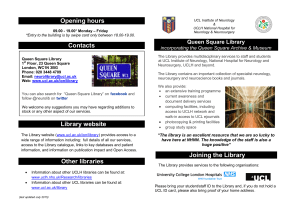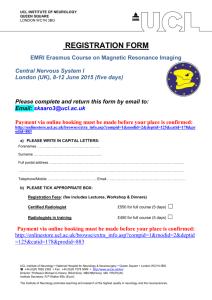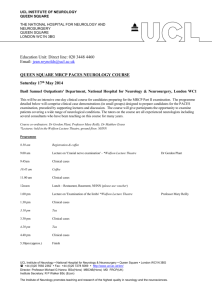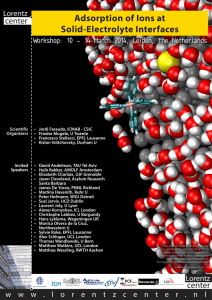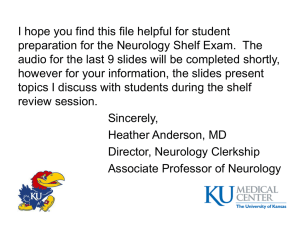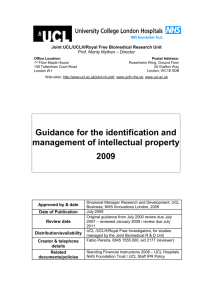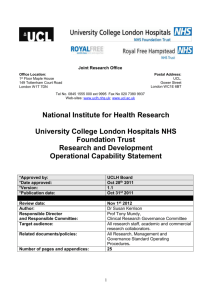Queen Square Library (Neurology and
advertisement
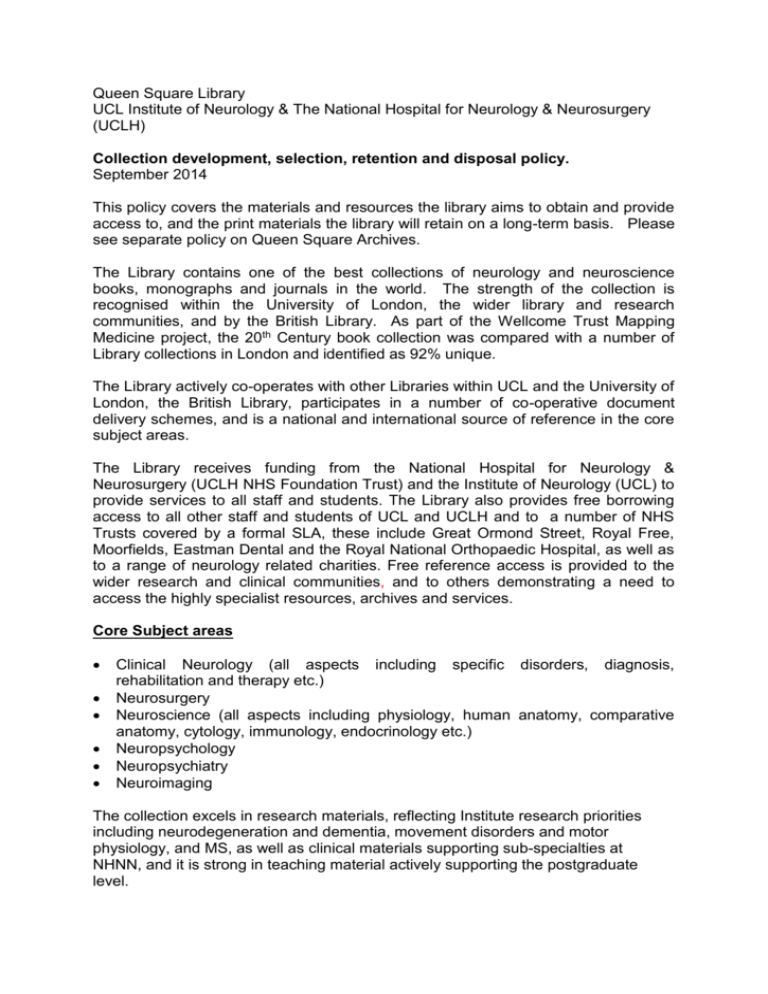
Queen Square Library UCL Institute of Neurology & The National Hospital for Neurology & Neurosurgery (UCLH) Collection development, selection, retention and disposal policy. September 2014 This policy covers the materials and resources the library aims to obtain and provide access to, and the print materials the library will retain on a long-term basis. Please see separate policy on Queen Square Archives. The Library contains one of the best collections of neurology and neuroscience books, monographs and journals in the world. The strength of the collection is recognised within the University of London, the wider library and research communities, and by the British Library. As part of the Wellcome Trust Mapping Medicine project, the 20th Century book collection was compared with a number of Library collections in London and identified as 92% unique. The Library actively co-operates with other Libraries within UCL and the University of London, the British Library, participates in a number of co-operative document delivery schemes, and is a national and international source of reference in the core subject areas. The Library receives funding from the National Hospital for Neurology & Neurosurgery (UCLH NHS Foundation Trust) and the Institute of Neurology (UCL) to provide services to all staff and students. The Library also provides free borrowing access to all other staff and students of UCL and UCLH and to a number of NHS Trusts covered by a formal SLA, these include Great Ormond Street, Royal Free, Moorfields, Eastman Dental and the Royal National Orthopaedic Hospital, as well as to a range of neurology related charities. Free reference access is provided to the wider research and clinical communities, and to others demonstrating a need to access the highly specialist resources, archives and services. Core Subject areas Clinical Neurology (all aspects including specific disorders, diagnosis, rehabilitation and therapy etc.) Neurosurgery Neuroscience (all aspects including physiology, human anatomy, comparative anatomy, cytology, immunology, endocrinology etc.) Neuropsychology Neuropsychiatry Neuroimaging The collection excels in research materials, reflecting Institute research priorities including neurodegeneration and dementia, movement disorders and motor physiology, and MS, as well as clinical materials supporting sub-specialties at NHNN, and it is strong in teaching material actively supporting the postgraduate level. Book – (print and electronic) Selection and acceptance policy - within the confines of the budget (and resource implications for donations): the Library will purchase one copy of all books cited on the reading lists of Institute of Neurology run courses, in both print and electronic form where available. Where items are identified by course tutors as basic texts, more than one copy will be purchased. the Library will purchase one copy of books suggested by members of Institute and Hospital staff, and other Library users based at Queen Square. If necessary, priority will be given to books of interest to more than one department or group. the Library will purchase new editions when they are published of any books already held in Library stock that have been widely used. the Library will obtain either from the authors or by purchase copies of books written by members of Institute and Hospital staff. The Library will add to stock all donated items where their subject directly relates to the core subject areas listed above, in closely related fields, or they are written by Institute or Hospital staff. the Library will purchase other books within core and related subject areas as suggested by Library staff and users, subject to budget and availability. Retention policy - within the limits of space available: the Library will retain one copy of all books in core subject areas which are of historical value, or unique to the collection or by Institute and Hospital staff. furthermore, as space allows, the library will retain additional books in core subject areas, for which there is likely to be an ongoing need. items within the areas identified above that are no longer current will be removed to store or transferred to the Historical collection. all other items will be disposed of. in the event of a need to reduce print holdings, items in related fields and any duplicate items will be disposed of first. Journals (Print & Electronic) Selection Policy – within the confines of the budget: The Library will aim to provide access to print copies of all journals identified as essential by Institute and Hospital Staff & other users based at Queen Square, but priority will be given as follows: to print journals whose subjects fall within the core areas covered, and closely related fields, electronic access would also be sought via UCL/NHS deals. Priority would be given to providing print access to titles of use to Hospital staff (where remote access to electronic versions for NHS users is not possible). Priority would be given to titles of use to a wide group of users, titles identified as of key significance by departments, and titles not otherwise locally available. Other factors which would be used as selection criteria could include Impact Factors, and the publication patterns of Institute and Hospital staff. the Library will endeavour to provide and promote electronic access to as wide a range of journals as possible via UCL/UCLH and the NHS. The Library will not independently purchase specialist electronic journal subscriptions without making these available to the wider UCL or UCLH networks, unless restricted by the providers licence. The aim is to share the cost of subscriptions and work collaboratively with other Libraries within UCL & UCLH to reduce unit cost and promote cross sectoral working and purchasing. Retention policy (within the limits of space available) arrangements for reciprocal and collaborative archiving of print materials are made within the UCL, UCLH and wider Library networks. the Library will retain all print journals in core subject areas. However, if for space reasons it were to become necessary to dispose of journal back-runs, holdings of journals would be reduced to those not available electronically. The Library will retain print holdings of other titles only where there is demonstrable use, they are not available to all users electronically in the library or locally in another Library. One current year of science news & current affairs journals will be kept where there is demonstrable use. Disposal Policy Decisions on subscription cancellation, and the retention and/or disposal of print material will take into due consideration: subject, availability in electronic format remotely, tie-ins with publisher deals for electronic access, impact on electronic and/or print access to the wider UCL & UCLH, availability in the Library (either in print or electronic format) to all Library users, demonstrable use, user feedback, consultation with other Libraries within the UCL/UCLH network and the wider Library community, and the Library’s national and Queen Square archive role. Items selected for disposal will be offered to Library users, to the wider not for profit/Library and archives, neurology and neuroscience communities, to commercial dealers (for a fee), to overseas charities (providing no significant costs are incurred), and as a last resort will be recycled. Any items with a clear value will be sold, and the funds returned to an appropriate Library budget to be reinvested in the stock or the service.
